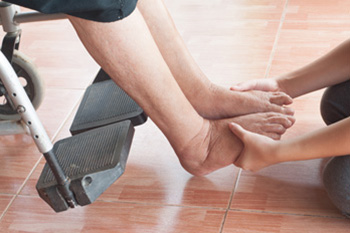
As people age, their toenails often become thicker, more brittle, and harder to manage. For many seniors, simple tasks like trimming toenails can become difficult due to limited flexibility, vision changes, or conditions like arthritis. Unfortunately, neglecting toenail care can lead to painful problems, such as ingrown nails, fungal infections, or even ulcers in those with diabetes or poor circulation. Regular toenail maintenance is essential for foot health and overall mobility. Nails should be trimmed straight across, smoothed with a file, and kept clean and dry. Thick or discolored nails may be a sign of fungal infection or other issues that require medical attention. Seniors with difficulty reaching their feet or with underlying health conditions should have their toenails professionally trimmed by a podiatrist. Proper toenail care helps prevent discomfort and keeps feet healthier longer. If you are a senior, it is suggested that you schedule an appointment with a podiatrist for safe, professional toenail care and a comprehensive foot check-up.
Proper foot care is something many older adults forget to consider. If you have any concerns about your feet and ankles, contact Barry P. Weinstein, DPM from Bellaire Podiatry. Our doctor can provide the care you need to keep you pain-free and on your feet.
The Elderly and Their Feet
As we age we start to notice many changes in our body, but the elder population may not notice them right away. Medical conditions may prevent the elderly to take notice of their foot health right away. Poor vision is a lead contributor to not taking action for the elderly.
Common Conditions
Susceptible Infections
Diabetes and poor circulation can cause general loss of sensitivity over the years, turning a simple cut into a serious issue.
If you have any questions please feel free to contact one of our offices located in Bellaire and Houston, TX . We offer the newest diagnostic and treatment technologies for all your foot and ankle needs.
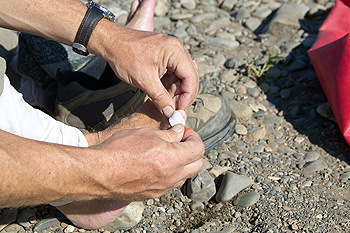
Blisters between the toes can be painful and uncomfortable, often causing irritation with every step. The primary symptom is a fluid-filled bump that forms between the toes, which may be red, swollen, or tender to the touch. Blisters are typically caused by friction, such as from wearing poorly fitted shoes or excessive moisture. Activities like running or dancing can also increase the risk of developing blisters in this sensitive area. The friction can lead to a burning or stinging sensation, especially when pressure is applied. Popping a blister yourself is not recommended, as it can lead to infection. A podiatrist can help by properly draining any painful blisters and providing advice on prevention, including recommending the right footwear, moisture-wicking socks, or custom orthotics. This type of doctor may also offer guidance on how to care for the area to avoid infection and encourage faster healing. If you have developed blisters between the toes, it is suggested that you schedule an appointment with a podiatrist.
Blisters are prone to making everyday activities extremely uncomfortable. If your feet are hurting, contact Barry P. Weinstein, DPM of Bellaire Podiatry. Our doctor can provide the care you need to keep you pain-free and on your feet.
Foot Blisters
Foot blisters develop as a result of constantly wearing tight or ill-fitting footwear. This happens due to the constant rubbing from the shoe, which can often lead to pain.
What Are Foot Blisters?
A foot blister is a small fluid-filled pocket that forms on the upper-most layer of the skin. Blisters are filled with clear fluid and can lead to blood drainage or pus if the area becomes infected.
How Do Blisters Form?
Blisters on the feet are often the result of constant friction of skin and material, usually by shoe rubbing. Walking in sandals, boots, or shoes that don’t fit properly for long periods of time can result in a blister. Having consistent foot moisture and humidity can easily lead to blister formation.
Prevention & Treatment
It is important to properly care for the affected area in order to prevent infection and ease the pain. Do not lance the blister and use a Band-Aid to provide pain relief. Also, be sure to keep your feet dry and wear proper fitting shoes. If you see blood or pus in a blister, seek assistance from a podiatrist.
If you have any questions, please feel free to contact one of our offices located in Bellaire and Houston, TX . We offer the newest diagnostic and treatment technologies for all your foot care needs.
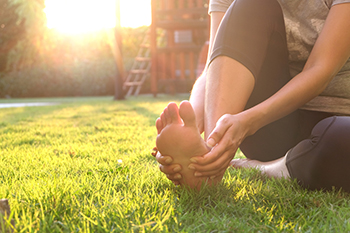
Foot pain while walking can result from various conditions that affect the muscles, bones, and soft tissues. Overuse from prolonged standing, walking, or high-impact activities can lead to inflammation and soreness, making each step uncomfortable. Injuries such as sprains, fractures, or tendon strains may cause sharp or persistent pain, limiting mobility. Plantar fasciitis, a condition that affects the thick band of tissue on the bottom of the foot, often leads to stabbing heel pain, especially with the first steps in the morning. Metatarsalgia, which causes discomfort in the ball of the foot, can develop from excessive pressure or wearing unsupportive footwear. If you have foot pain that has increased while walking, it is suggested that you consult a podiatrist who can determine what the cause is, and offer appropriate treatment solutions.
Foot Pain
Foot pain can be extremely painful and debilitating. If you have a foot pain, consult with Barry P. Weinstein, DPM from Bellaire Podiatry. Our doctor will assess your condition and provide you with quality foot and ankle treatment.
Causes
Foot pain is a very broad condition that could be caused by one or more ailments. The most common include:
Diagnosis
To figure out the cause of foot pain, podiatrists utilize several different methods. This can range from simple visual inspections and sensation tests to X-rays and MRI scans. Prior medical history, family medical history, and any recent physical traumatic events will all be taken into consideration for a proper diagnosis.
Treatment
Treatment depends upon the cause of the foot pain. Whether it is resting, staying off the foot, or having surgery; podiatrists have a number of treatment options available for foot pain.
If you have any questions, please feel free to contact one of our offices located in Bellaire and Houston, TX . We offer the newest diagnostic and treatment technologies for all your foot care needs.
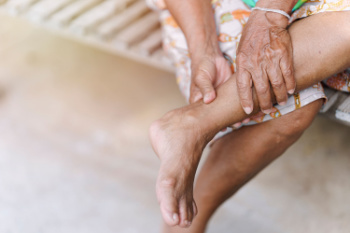
Your feet do the hard work of carrying you everywhere, yet they are often ignored until there is a problem. Do you want feet that are both healthy and attractive? It takes more than an occasional pedicure. Everyday foot care is a must. First, moisture matters, but in moderation. Dry heels lead to cracks, while sweaty feet invite fungus. Use a good foot cream daily, but skip between the toes to prevent infections. Secondly, trim your toenails with care. Cutting toenails too short or rounding the edges increases the risk of painful ingrown nails. Trim straight across and file gently for a smooth finish. Third, shoes shape your feet over time. Wearing tight, unsupportive footwear can lead to bunions, corns, and calluses. Choose shoes that fit well and support your arch. If you have ongoing foot pain, persistent skin issues, or nail concerns, it is suggested that you see a podiatrist for appropriate treatment.
Everyday foot care is very important to prevent infection and other foot ailments. If you need your feet checked, contact Barry P. Weinstein, DPM from Bellaire Podiatry. Our doctor can provide the care you need to keep you pain-free and on your feet.
Everyday Foot Care
Often, people take care of their bodies, face and hair more so than they do for their feet. But the feet are a very important aspect of our bodies, and one that we should pay more attention to. Without our feet, we would not be able to perform most daily tasks.
It is best to check your feet regularly to make sure there are no new bruises or cuts that you may not have noticed before. For dry feet, moisturizer can easily be a remedy and can be applied as often as necessary to the affected areas. Wearing shoes that fit well can also help you maintain good foot health, as well as making it easier to walk and do daily activities without the stress or pain of ill-fitting shoes, high heels, or even flip flops. Wearing clean socks with closed shoes is important to ensure that sweat and bacteria do not accumulate within the shoe. Clean socks help to prevent Athlete’s foot, fungi problems, bad odors, and can absorb sweat.
If you have any questions please feel free to contact one of our offices located in Bellaire and Houston, TX . We offer the newest diagnostic and treatment technologies for all your foot and ankle needs.
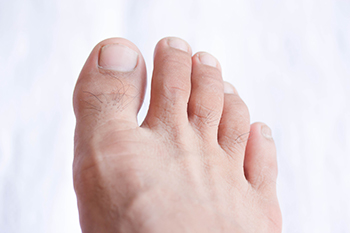
A loose toenail often develops gradually, but may also occur suddenly due to trauma. The toenail is attached to the nail bed beneath it, and when this connection weakens, the nail may partially or completely detach. Trauma, such as dropping a heavy object on the toe or repeated pressure from ill-fitting footwear, can cause a toenail to loosen. A fungal infection may also lead to separation of the toenail from the nail bed, often accompanied by thickening, discoloration, and debris under the nail. Other causes of loose toenails include psoriasis, allergic reactions to nail products, hyperthyroidism, or side effects from certain medication. It is important to avoid pulling a loose toenail off, as this can lead to infection or improper regrowth. A podiatrist can assess the cause, trim away damaged portions, provide treatment for infections, and, if necessary, remove the nail to allow for healthy regrowth. If you have problems with loose toenails, it is suggested that you schedule an appointment with a podiatrist for an exam and treatment options.
Toe pain can disrupt your daily activities. If you have any concerns, contact Barry P. Weinstein, DPM of Bellaire Podiatry. Our doctor can provide the care you need to keep you pain-free and on your feet.
What Causes Toe Pain?
Most severe toe pain is caused due to a sports injury, trauma from dropping something heavy on the toe, or bumping into something rigid. Other problems can develop over time for various reasons.
Toe pain can be caused by one or more ailments. The most common include:
When to See a Podiatrist
Diagnosis
In many cases the cause of toe pain is obvious, but in others, a podiatrist may want to use more advanced methods to determine the problem. These can range from simple visual inspections and sensation tests to X-rays and MRI scans. Prior medical history, family medical history, and any recent physical traumatic events will all be taken into consideration for a proper diagnosis.
Treatment
Treatments for toe pain and injuries vary and may include shoe inserts, padding, taping, medicines, injections, and in some cases, surgery. If you believe that you have broken a toe, please see a podiatrist as soon as possible.
If you have any questions please feel free to contact one of our offices located in Bellaire and Houston, TX . We offer the newest diagnostic tools and technology to treat your foot and ankle needs.
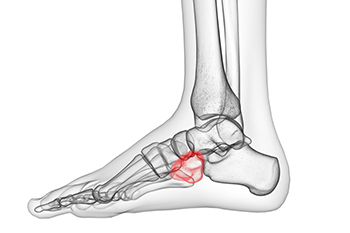
Cuboid syndrome occurs when the cuboid bone in the foot becomes partially dislocated or misaligned, leading to pain and discomfort. This bone is located on the outer side of the foot, and misalignment can result from repetitive stress, ankle sprains, or sudden twisting motions. Common symptoms include pain on the outside of the foot, difficulty walking, and a feeling of instability when standing. The pain may worsen with physical activity or pressure exerted on the foot. Diagnosing cuboid syndrome often involves a physical examination by a podiatrist, who may manipulate the foot to check for tenderness or abnormal movement of the cuboid bone. X-rays or other imaging tests may also be used to rule out other conditions and confirm the diagnosis. If you have pain on the outside of your foot, it is suggested that you consult a podiatrist who can determine the cause and provide treatment.
Cuboid syndrome, also known as cuboid subluxation, occurs when the joints and ligaments near the cuboid bone in the foot become torn. If you have cuboid syndrome, consult with Barry P. Weinstein, DPM from Bellaire Podiatry. Our doctor will assess your condition and provide you with quality foot and ankle treatment.
Cuboid syndrome is a common cause of lateral foot pain, which is pain on the outside of the foot. The condition may happen suddenly due to an ankle sprain, or it may develop slowly overtime from repetitive tension through the bone and surrounding structures.
Causes
The most common causes of cuboid syndrome include:
Symptoms
A common symptom of cuboid syndrome is pain along the outside of the foot which can be felt in the ankle and toes. This pain may create walking difficulties and may cause those with the condition to walk with a limp.
Diagnosis
Diagnosis of cuboid syndrome is often difficult, and it is often misdiagnosed. X-rays, MRIs and CT scans often fail to properly show the cuboid subluxation. Although there isn’t a specific test used to diagnose cuboid syndrome, your podiatrist will usually check if pain is felt while pressing firmly on the cuboid bone of your foot.
Treatment
Just as the range of causes varies widely, so do treatments. Some more common treatments are ice therapy, rest, exercise, taping, and orthotics.
If you have any questions, please feel free to contact one of our offices located in Bellaire and Houston, TX . We offer the newest diagnostic and treatment technologies for all your foot care needs.
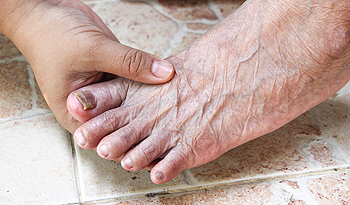
Toenail fungus, or onychomycosis, is a fungal infection that begins in the skin and spreads to the nail bed. It thrives in warm, moist environments like sweaty shoes, near public pools, and locker rooms. While anyone can get it, older adults, diabetic individuals and those with weakened immune systems are more vulnerable due to slower nail growth and reduced circulation. Infected nails become thick, brittle, yellow, or brown, often crumbling at the edges. The condition can cause discomfort, a foul odor, and in severe cases, pain when walking. Prevention includes keeping feet dry, wearing breathable shoes, and avoiding barefoot exposure in public spaces. Treatment ranges from topical antifungals to prescription oral medications, or laser therapy for stubborn cases. Early intervention is key to preventing permanent nail damage. If you have symptoms of toenail fungus, it is suggested that you see a podiatrist for expert treatment options.
For more information about treatment, contact Barry P. Weinstein, DPM of Bellaire Podiatry. Our doctor can provide the care you need to keep you pain-free and on your feet.
Toenail Fungus Treatment
Toenail fungus is a condition that affects many people and can be especially hard to get rid of. Fortunately, there are several methods to go about treating and avoiding it.
Antifungals & Deterrence
Oral antifungal medicine has been shown to be effective in many cases. It is important to consult with a podiatrist to determine the proper regiment for you, or potentially explore other options.
Applying foot powder on the feet and shoes helps keep the feet free of moisture and sweat.
Sandals or open toed shoes – Wearing these will allow air movement and help keep feet dry. They also expose your feet to light, which fungus cannot tolerate. Socks with moisture wicking material also help as well.
If you have any questions please feel free to contact one of our offices located in Bellaire and Houston, TX . We offer the newest diagnostic tools and technology to treat your foot and ankle needs.

Recurrent ankle sprains occur when the ankle repeatedly rolls or twists, causing damage to ligaments that stabilize the joint. These repeated injuries weaken the ankle over time, leading to chronic instability, swelling, and pain. Common causes include inadequate healing from previous sprains, weakened muscles, or structural issues like high arches or loose ligaments. Each sprain increases the risk of further injury, as the ligaments become less effective at supporting the joint. Persistent instability can interfere with daily activities and increase the likelihood of arthritis in the ankle. Treatment focuses on strengthening the ankle through targeted exercises, including balance exercises, and wearing supportive braces. Custom orthotics may also improve alignment and reduce stress on the joint. In severe cases, surgical intervention may be necessary. If you are experiencing recurrent ankle sprains, it is suggested that you consult a podiatrist to prevent long-term damage and restore stability.
Although ankle sprains are common, they aren’t always minor injuries. If you need your ankle injury looked at, contact Barry P. Weinstein, DPM from Bellaire Podiatry. Our doctor can provide the care you need to keep you pain-free and on your feet.
How Does an Ankle Sprain Occur?
Ankle sprains are the result of a tear in the ligaments within the ankle. These injuries may happen when you make a rapid shifting movement while your foot is planted. A less common way to sprain your ankle is when your ankle rolls inward while your foot turns outward.
What Are the Symptoms?
Preventing a Sprain
Treatment of a Sprain
In many cases, the RICE method (Rest, Ice, Compression, and Elevate) is used to treat ankle sprains. However, you should see a podiatrist to see which treatment option would work best with your injury. In severe cases, surgery may be required.
It is important to ask your doctor about rehab options after you receive treatment for your injury. Stretching, strength training, and balance exercises may help the ankle heal while also preventing further injury.
If you have any questions, please feel free to contact one of our offices located in Bellaire and Houston, TX . We offer the newest diagnostic and treatment technologies for all your foot care needs.